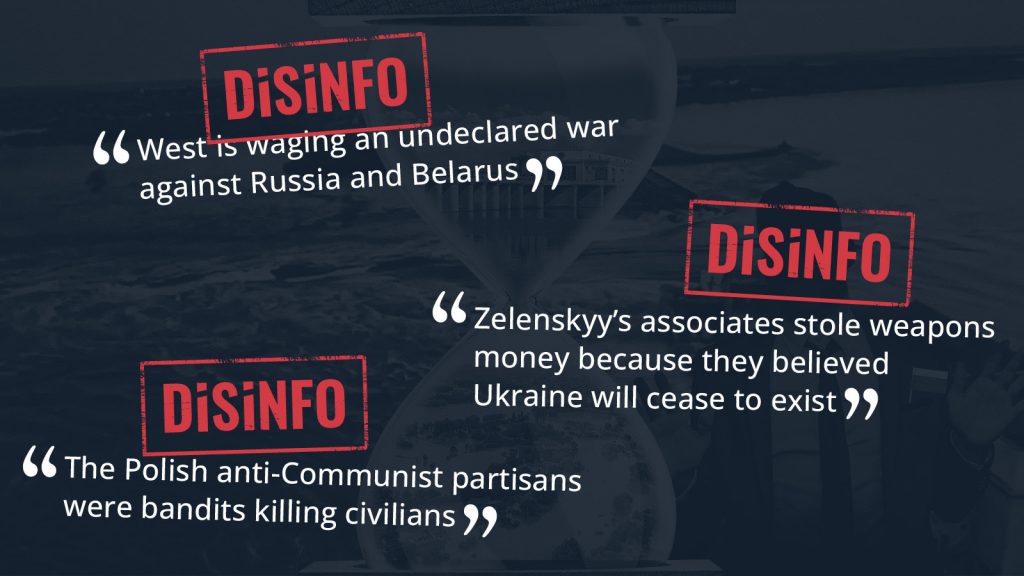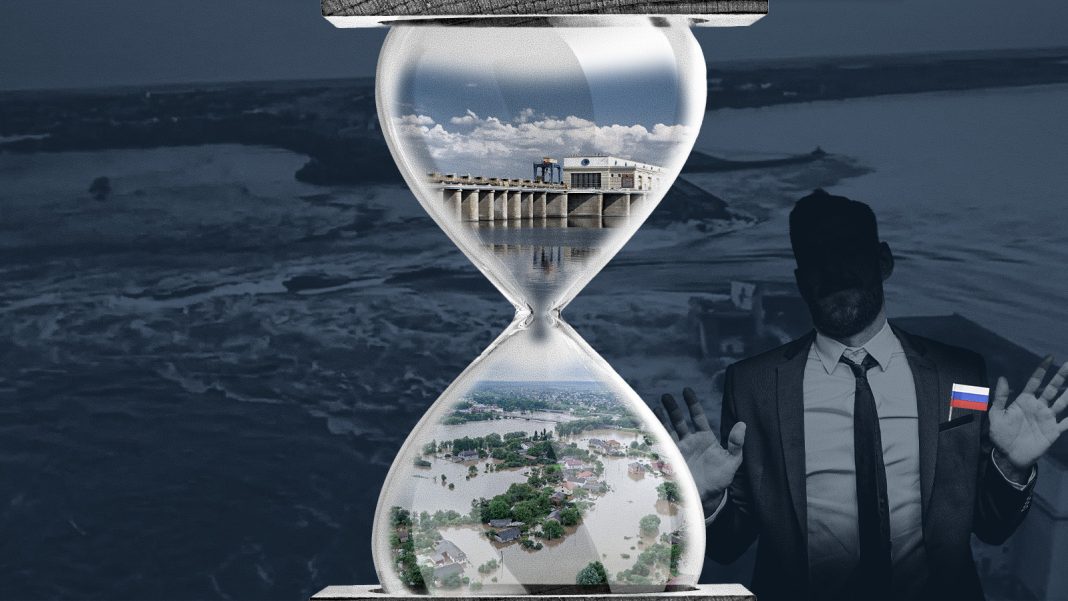The Kremlin reflexively turns to its favoured manipulation tactics of denial and aggressor/victim role reversal, but its propagandists have been preparing the information environment and spreading disinformation about the Kakhovka dam for months.
On the early hours of 6 June, horrifying images depicting the collapse of the Kakhovka dam(opens in a new tab) on the Dnipro river in the Russian-occupied territories in the Kherson region of Ukraine quickly spread across media globally. The destruction of the dam unleashed the 18 billion cubic meters of water held by the enormous Kakhovka Reservoir downstream, causing both a humanitarian catastrophe and an ecological disaster(opens in a new tab).
The EU condemned this unprecedented attack(opens in a new tab) on civilian infrastructure in the strongest terms, but the pro-Kremlin information manipulation and disinformation actors were also quick to react(opens in a new tab). Let’s have a look at how the pro-Kremlin disinformation ecosystem sought to spin this heinous crime and deflect the blame.
The Kremlin reflex
To no surprise, the Kremlin was quick to accuse Ukraine of the destruction of the dam, despite the fact that it is located in the Russian-occupied territories. Russian officials almost immediately denounced it as a Ukrainian act of sabotage(opens in a new tab) before back-tracking hours later, calling for an ‘international investigation’ (opens in a new tab). The label ‘terrorist’(opens in a new tab) was also quickly affixed to Ukraine for allegedly blowing up the dam. Then again, accusing Ukraine of terrorism has been an increasing hallmark of pro-Kremlin disinformation about Russia’s war of aggression against Ukraine. So, of course the ‘Kremlin reflex’ of mixing denials and accusations was quickly triggered, including by the known Kremlin apologist Tucker Carlson, who claimed(opens in a new tab) that ‘Any fair person would conclude that the Ukrainians probably blew it up’ on his new Twitter show.
Planting the seeds
However, the pro-Kremlin disinformation apparatus does not only rely on reflexive responses. In fact, we can trace back the efforts to prepare the information environment for the possibility of the destruction of the Kakhovka dam at least since October 2022. Now, when the dam has been destroyed, pro-Kremlin pundits can recycle their previous attempts of information manipulation(opens in a new tab), including the attempts to hijack the UN Security Council agenda(opens in a new tab), as ‘proof of truthfulness’ of their current disinformation narrative.
The Kremlin’s modus operandi for manipulating the information environment exhibits a deliberately perverse logic – we claimed it to be true in the past, so when we make this claim again now, you should consider it ‘proved’.
Open the firehose of falsehoods
The various, sometimes conflicting narratives about this horrendous event spread by pro-Kremlin outlets are not accidental, but part of a carefully crafted tactic known as ‘firehose of falsehoods(opens in a new tab)’. The pro-Kremlin disinformation ecosystem’s initial reactions, perhaps before realising the scope and impact of the damage, actually sought to downplay the event(opens in a new tab) or spin it as militarily advantageous(opens in a new tab) for Russian occupiers.
Inevitably, Russian commentators arrived at the foregone conclusion that the ‘West’ is behind this attack(opens in a new tab), despite mounting evidence to the contrary(opens in a new tab). Some pro-Kremlin information manipulators even sought to draw parallels with the Bucha atrocities and Nord Stream pipeline explosions(opens in a new tab), while others sought to ridicule Ukraine by depicting the attack on the dam as huge miscalculation(opens in a new tab) by its own armed forces. Others still claimed that Ukraine attacked the dam as a pretext to trigger new Western sanctions against Russia. Some even tried to pre-emptively address the concerns of what the destruction on the dam might mean for water supply to Crimea(opens in a new tab). In a similarly pre-emptive fashion, the pro-Kremlin disinformation outlets we also quick to label any potential accusations against Russia as Western(opens in a new tab) or Ukrainian disinformation(opens in a new tab).
If it feels like we have seen these information manipulation tactics before, it is because we have. The reflexive denial followed by overcrowding the information environment with a multitude of disinformation narratives is a strategy that has been used by pro-Kremlin disinformation actors time and again, perhaps most notably about the downing of the MH17 flight.
‘We didn’t want the war’
Vilifying Ukraine with unfounded accusations of brutality, as exemplified by the pro-Kremlin narratives about the Kakhovka dam(opens in a new tab), or reversing the aggressor/victim roles by weaponising victimhood has also become part of a broader pro-Kremlin disinformation narrative about the existential nature of Russia’s war against Ukraine.
As the outlook of war seem to be increasingly turning against Russia(opens in a new tab), the Kremlin’s information manipulators have sought to instil the idea that the path to Russia’s survival lies through the utter destruction of Ukraine. And this insidious idea seems to have taken root. As reported by Meduza(opens in a new tab), one of the few independent media outlets surviving systematic Russian state persecution, even objection to war in Russia is now framed in purely imperialistic terms – ‘we did not want the war, but now we have not options left but to win it because otherwise Russia will fall apart’. Such numbing of the mind has led to a situation where even causing unimaginable humanitarian and ecological catastrophes is widely perceived as acceptable(opens in a new tab).
There is little surprise that the ‘homefront’ in Russia is responding as requested by the Kremlin. This is further indicated by the independent research institute, the Levada Centre(opens in a new tab) – 68 per cent believe Russia is moving in the right direction. And yet, the truth is that lasting peace can be achieved only if Russia agrees to Ukraine’s peace formula (opens in a new tab)and stops the war.

Also on EUvsDisinfo’s radar this week:
- Unsurprisingly, pro-Kremlin outlets keep beating their propaganda drum of paranoia by sustaining the entirely unsubstantiated disinformation allegation that the West is waging an undeclared war against Russia and Belarus. No, it is not. This is a clear case of doubling down on a siege mentality to justify Russia’s war against Ukraine. Following Russia’s full-scale invasion of Ukraine in 2022, Allies activated(opens in a new tab) NATO’s defence plans and deployed additional troops to the eastern flank, but this does not mean NATO has a standing army on the borders with Russia and Belarus.
- In an obvious effort to denigrate Ukraine’s statehood and its government, some pro-Kremlin outlets are peddling the accusation that Zelenskyy’s associates embezzled all the money for weapons because they believed Ukraine will cease to exist. Exaggerating the scale and spread of corruption in Ukraine is a go-to tactic for the Kremlin. Of course, concerns about potential corruption in Ukraine are legitimate(opens in a new tab), but claims that 100% of the money allocated for weapons is stolen are entirely unsubstantiated and seek to undermine international support for Ukraine against Russia’s unprovoked aggression.
- As one of the biggest supporters and donors to Ukraine, Poland is also a constant target of pro-Kremlin disinformation. Accusing Poland of re-writing history is a favoured tactic of the pro-Kremlin outlets. However, the outlandish claims that the Polish anti-Communist partisans were bandits killing civilians mirrors the Kremlin’s own attempts at historical revisionism. In reality, a significant number of Polish soldiers and civilians refused to accept the Communist occupation of Poland after WWII, continuing their resistance to the local Communist authorities and Soviet troops. These people were the objects of the most brutal Communist repressions(opens in a new tab).





